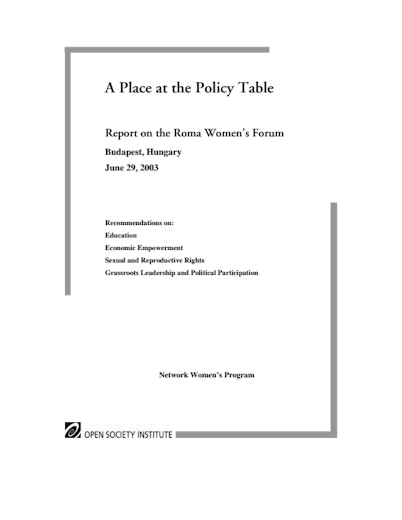Few minority groups in Europe face as much social, economic, and political discrimination as do Romani people. The situation is even worse for Romani women, who also must deal with sexism that further violates their human rights. There are encouraging signs, however, that local governments, NGOs, international institutions, and the Romani community itself are taking steps to identify the most pressing problems affecting Romani women and developing strategies to improve their lives.
An important milestone in this process was the Roma Women's Forum held on June 29, 2003 in Budapest. The forum brought together more than 100 Romani activists, donors, international human rights activists, and government representatives from Central and Eastern Europe—where most Roma currently live—as well as Western Europe and the United States. Participants openly discussed key issues of great concern among Romani women, such as equal access to quality education, forced sterilization, and poverty. They also developed a set of recommendations for policymakers within the region and beyond.
The conference was organized by Romani Women's Initiative, a partnership between Romani women activists and the Network Women's Program. A conference report, A Place at the Policy Table, is available in PDF format.
The Roma Women's Forum was affiliated with a two-day conference, "Roma in an Expanding Europe: Challenges for the Future," that began the following day in Budapest. "Roma in an Expanding Europe" was co-sponsored by the Open Society Institute, the World Bank, and the European Union. It brought together Romani leaders, high-level government officials from eight Central and Eastern European countries, and other international leaders to address the need for Roma inclusion in policymaking processes.
At the closing session, the governments of Bulgaria, Croatia, the Czech Republic, Hungary, Macedonia, Romania, Serbia and Montenegro, and Slovakia each endorsed the "Decade of Roma Inclusion," which aims to provide a framework for governments to set their own goals for Roma integration.
Read more
Voices In Depth
Inside the Archives: George Soros and the Fight for Roma Dignity

For over 40 years, George Soros has been the leading private supporter of Europe’s Roma—the continent’s largest and most excluded ethnic minority—championing Roma leaders in their fight for equality and against deep-rooted discrimination.
Roma Rights
A New Roma-led Vision of Power

The new, independent, Roma Foundation for Europe is backed by a €100 million pledge that builds on Open Society’s over 30 years of support for Roma causes.
Roma Rights
Q&A: A Step Toward Justice for Roma Women

In November, the Slovak Republic formally apologized to Roma women for a program of forced sterilizations that stretched out for decades. How a Slovak human rights group helped hold the government accountable.
